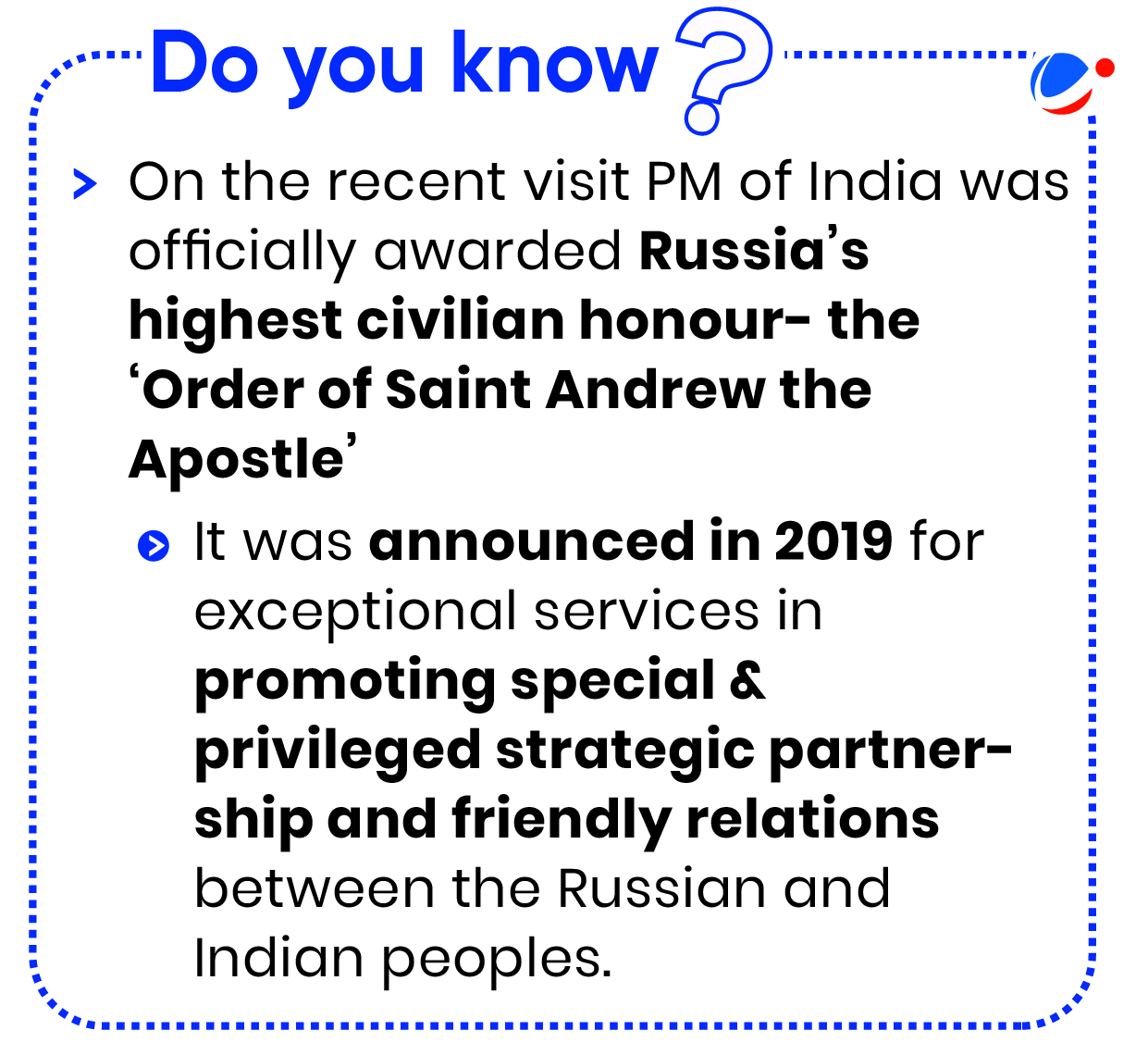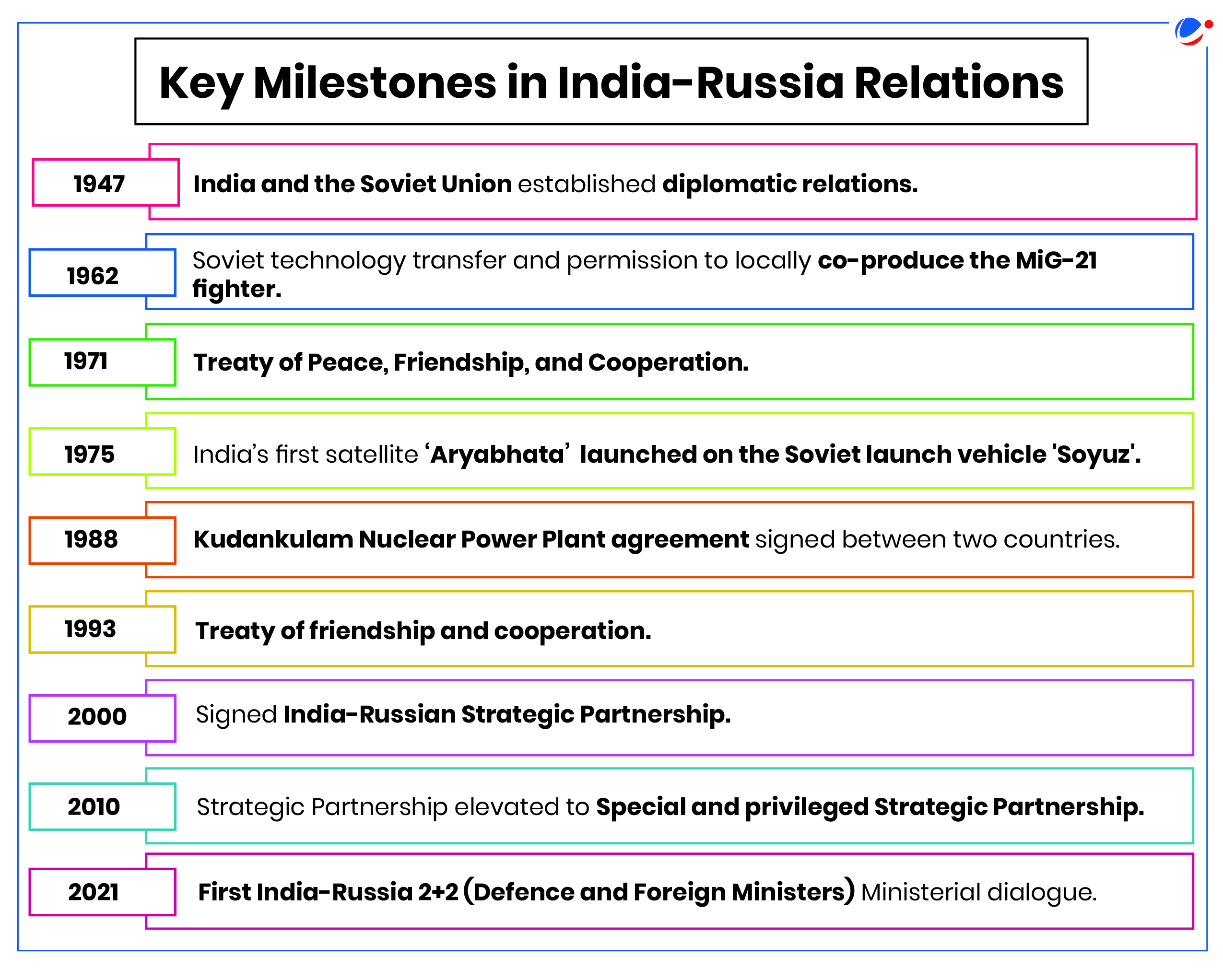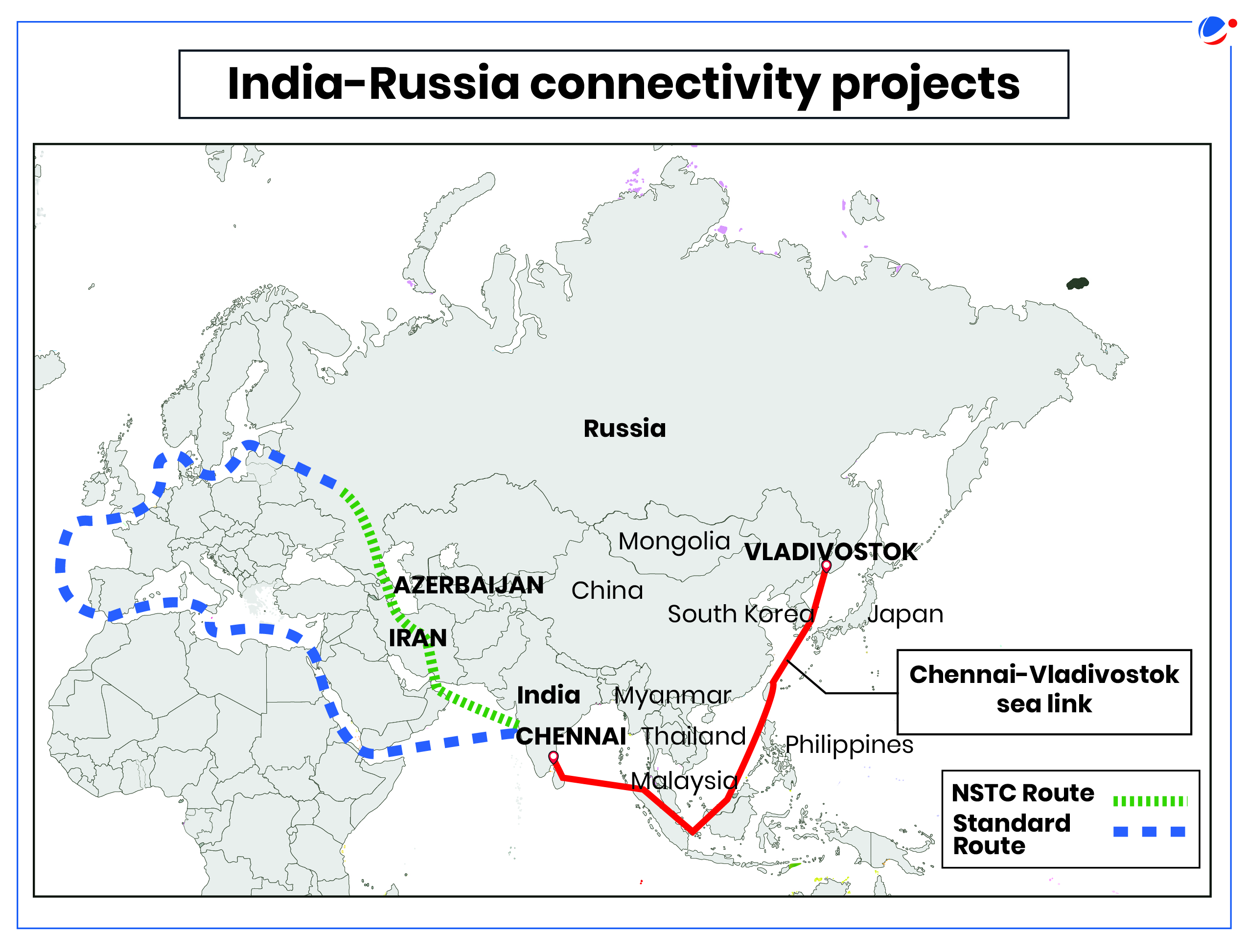Why in the news?
Prime Minister of India officially visited Russia in July 2024 for the 22nd India-Russia Annual Summit.

More about the news
- It marked the resumption of the India-Russia annual summit, as the last annual summit took place in New Delhi in 2021.
- PM's visit is perceived as a confirmation of India's strategic ability to pursue a balanced and independent foreign policy and signalling to the West about its strategic autonomy.
Key Outcomes of the Visit
- Trade and Economic partnership: 'Enduring and Expanding Partnership' focusing on economics.
- Military cooperation: Agreed to boost joint manufacturing in India of spare parts and components for maintenance of Russian origin arms and defence equipment under Make-in-India program.
- Set the bilateral trade target of USD 100 billion by 2030.
- Promote bilateral settlement system using national currencies.
- Signed Program of India-Russia cooperation in trade, economic and investment spheresin the Russian Far East for the period from 2024 -2029, and cooperation principles in the Arctic zone of the Russian Federation.
- On Ukraine: Peaceful resolution of the conflict around Ukraine through dialogue and diplomacy including engagement between both parties.
- India will open two new consulates in Kazan and Yekaterinburg to help facilitate services for the growing community.

Contemporary Significance of India-Russia Relations
For both Countries
- Strategic: Both India and Russia have a shared concern about China's rise in their neighbourhood and to prevent the rise of China as a regional hegemon.
- Shared Vision of World Order: Both countries advocate for a multipolar world order, opposing unilateral actions by any single country.
- Military collaboration: It has shifted from a buyer-seller dynamic to joint research, design, and production. E.g. Joint production of Brahmos cruise missile and Kalashnikov AK-203 assault rifles.
- Protecting Strategic autonomy: Robust ties help India and Russia balance their increasing dependence on USA and China respectively, signalling an independent course of foreign policy.
- Russia has approved the sale of Brahmos missiles to Philippines which are meant to deter China in the South China Sea, even in the backdrop of growing Russia-China relations.
- Combatting terrorism: Both countries desire expeditious finalization and adoption of the Comprehensive Convention on International Terrorism in the UN framework
- Multilateral: Both countries cooperate actively in multilateral forums like UN, BRICS, NSG, and SCO.
- E.g., both supported the addition of new member States to the expanded BRICS family.
Significance for Russia | Significance for India |
|
|
Challenges in Indo-Russia relationship

- Challenges to India's Russia Policy: PM's visit to Russia has received criticism from Ukraine and the USA on its timing and optics.
- Defense Challenges: The level of interoperability between the Indian and Russian armed forces is low, evidenced by the postponement of Indra exercises in 2022 and 2023.
- No major military deals have been concluded since the S-400 deal to avoid USA sanctions under CAATSA.
- Geopolitical Challenges:
- Economic Challenges: Rising Trade deficit with Russia enjoying a massive surplus. In 2023-24, India's exports to Russia were $4.3 billion, while imports stood at $61.4 billion.
- India-US convergences: India is increasingly aligning with the West, particularly the US, to address its economic modernization needs and the China challenge. E.g. Security relationship such as Quad.
- Growing Russia-China ties: Russia-China has no limits ties with bilateral trade over $240 billion.
- Rapprochement with Pakistan: Russia is keen to expand and deepen bilateral ties with Pakistan as it also supplies discounted oil to Pakistan. Russia also invited Pakistan to join INSTC.
- This has complicated the Rupee-Rouble deal, as Russia's Indian bank accounts are burdened with surplus Indian Rupees due to stagnated imports.
- Connectivity Challenges: Russian Far East and reviving the Chennai-Vladivostok maritime corridor may only yield limited trade gains as it lacks access to foreign markets restricting trade due to sanctions from Japan and South Korea.
- INSTC has been jeopardized by the recent conflict in Nagorno-Karabakh.
Way Forward
- Enhancing Mutual Trust: Both countries need to reinforce mutual trust amid growing apprehensions about Russia-China and India-US convergences.
- Diversifying trade: Indo-Russia trade should expand beyond oil, incorporating products from traditional sectors such as metallurgy, chemical industry, and space.
- Involvement of the private business sector can make the relationship more broad-based.
- Free Trade Agreement (FTA): India and Russian led Eurasian Economic Union-India negotiations over an FTA should be fast-tracked.
- Implementing Reciprocal Exchange of Logistics Agreement (RELOS): It will simplify military-to-military exchanges for exercises, training, port calls and Humanitarian Assistance and Disaster Relief (HADR) efforts.
- Defence dialogue: Both countries should hold military to military talks to resolve India's concerns on defence spare parts and maintenance issues.
- Broaden collaboration on bilateral and regional issues: such as collaboration on nuclear power plant in Bangladesh as well as developmental partnerships in Central Asia will add new dimension to ties.
- Strengthening Tier II diplomacy: Strengthening contacts with the new generation as well as academia and stationing Indian correspondents in Russia.
Related NewsRussian president recently paid an official visit to North Korea and Vietnam. Key outcomes of Russian President's visits
Potential Implications of the Visits
|






